| Listing 1 - 10 of 12 | << page >> |
Sort by
|
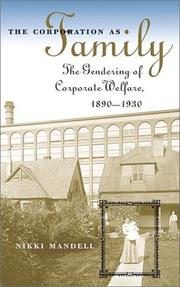
ISBN: 0807853518 0807826855 0807860395 9780807860397 9780807826850 9780807853511 9780807853511 9798890873002 Year: 2002 Publisher: Chapel Hill, N.C. : University of North Carolina Press,
Abstract | Keywords | Export | Availability | Bookmark
 Loading...
Loading...Choose an application
- Reference Manager
- EndNote
- RefWorks (Direct export to RefWorks)
Nikki Mandell explores the growth of corporate welfare programmes around the turn of the 20th century. She argues that businessmen hoped such programmes would transform conflict-ridden relations between management and labour into a harmonious partnership modelled after the Victorian family.
Industrial welfare. --- Business. --- Industrial welfare --- History. --- Occupational social work --- Social work, Occupational --- Social work in industry --- Welfare, Industrial --- Welfare work in industry --- Social service
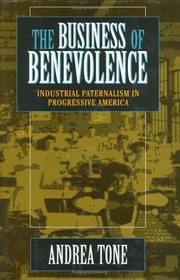
ISBN: 1501717480 9781501717482 0801430283 9780801430282 Year: 2018 Publisher: Ithaca, NY : Cornell University Press,
Abstract | Keywords | Export | Availability | Bookmark
 Loading...
Loading...Choose an application
- Reference Manager
- EndNote
- RefWorks (Direct export to RefWorks)
In the early twentieth century, an era characterized by unprecedented industrial strife and violence, thousands of employers across the United States pioneered a new policy of labor relations called welfare work. The results of the policy were paternalistic practices and forms of compensation designed not only to control workers, but also to advertise the humanity of corporate capitalism to thwart the advance of legislated reform. In a burgeoning literature on the development of the U.S. welfare state, Andrea Tone offers a new interpretation of the importance of welfare capitalism in shaping its development.
Industrial welfare --- Occupational social work --- Social work, Occupational --- Social work in industry --- Welfare, Industrial --- Welfare work in industry --- Social service --- History --- Paternalisme --- Service social dans l'industrie
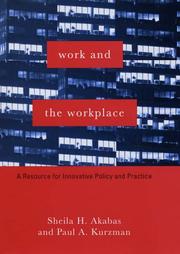
ISBN: 0231111665 0231510152 9780231510158 9780231111669 9780231111676 0231111673 Year: 2005 Publisher: New York : Columbia University Press,
Abstract | Keywords | Export | Availability | Bookmark
 Loading...
Loading...Choose an application
- Reference Manager
- EndNote
- RefWorks (Direct export to RefWorks)
For more than twenty years Sheila H. Akabas and Paul A. Kurzman have written extensively about workers and work organizations, and given leadership to the occupational social welfare movement worldwide. Recognized as leaders in their field, Akabas and Kurzman offer an invaluable and comprehensive look at the innovative ways in which management, labor organizations, government, and social workers can better respond to the needs of workers, their families, and communities.The authors consider the social, psychological, and economic conditions in the world of work; the domino impact of unemployment upon individuals, families, organizations, and communities; and the inadequacy of insurance, benefit and support systems, intended to respond to personal and systematic crises. They also provide case histories that illustrate how collaboration among management, labor, social work, and government opens new options for workers, their families, and those seeking entry into the workplace. The authors' discussion provides contemporary illustrations of evidence-based best practices that respond to the needs of the modern workplace. They analyze the barriers to entry into the workforce; the tension between work and family obligations; the sometime unsupportive nature of many jobs and settings; and work implications for persons with chronic or acute illnesses. In the concluding chapter, the authors assess current trends as they offer an optimistic review of the possibilities and positive future potential represented by career counseling, pre-retirement preparation, disability management, executive coaching, manpower programming, and managed care. Throughout the book, Akabas and Kurzman include case studies to illustrate innovative practice and provide study questions for each chapter.
Industrial welfare. --- Social service. --- Service social dans l'industrie --- Service social --- Benevolent institutions --- Philanthropy --- Relief stations (for the poor) --- Social service agencies --- Social welfare --- Social work --- Occupational social work --- Social work, Occupational --- Social work in industry --- Welfare, Industrial --- Welfare work in industry --- Human services --- Social service --- Industrial welfare --- E-books
Book
ISBN: 9048519950 9789048519958 9789089645814 9089645810 Year: 2016 Publisher: Amsterdam Amsterdam University Press
Abstract | Keywords | Export | Availability | Bookmark
 Loading...
Loading...Choose an application
- Reference Manager
- EndNote
- RefWorks (Direct export to RefWorks)
This book offers an in-depth exploration of the international phenomenon of enlightened paternalist capitalism and social engineering in the golden age of capitalism in the United States, United Kingdom, Germany, and France. Erik de Gier shows how utopian socialist, religious, and craft-based ideas influenced the welfare work and educations programmes offered by paternalistic businesses in different ways from nation to nation, looking closely at sites like the Pullman community in Chicago and Port Sunlight in the UK. De Gier brings the book fully up to date with a brief comparison to contemporary welfare capitalism in our highly flexible working world.
Industrial welfare --- Capitalism. --- History. --- Market economy --- Occupational social work --- Social work, Occupational --- Social work in industry --- Welfare, Industrial --- Welfare work in industry --- Economics --- Profit --- Capital --- Social service --- Capitalism --- History --- E-books --- Industrial welfare. --- HISTORY --- Annals --- Auxiliary sciences of history --- Social History. --- Reference. --- Essays. --- Civilization. --- #SBIB:93H3 --- #SBIB:316.8H00 --- #SBIB:35H437 --- Thematische geschiedenis --- Sociaal beleid: algemeen --- Beleidssectoren: sociale zekerheid
Book
ISBN: 0710061579 Year: 1968 Publisher: London
Abstract | Keywords | Export | Availability | Bookmark
 Loading...
Loading...Choose an application
- Reference Manager
- EndNote
- RefWorks (Direct export to RefWorks)
Industrial welfare --- Industries --- #SBIB:316.334.2A475 --- #SBIB:316.334.2A553 --- Industrial production --- Industry --- Occupational social work --- Social work, Occupational --- Social work in industry --- Welfare, Industrial --- Welfare work in industry --- Social aspects --- Arbeidssociologie: de maatschappelijke zekerheid --- Personeelsbeleid en loonbeleid, functieclassificaties --- Great Britain --- Social policy. --- Sociology of work --- Sociology of social care --- Economics --- Social service --- Industries, Primitive
Book
ISBN: 0226071219 9780226071213 Year: 1976 Publisher: Chicago: University of Chicago press,
Abstract | Keywords | Export | Availability | Bookmark
 Loading...
Loading...Choose an application
- Reference Manager
- EndNote
- RefWorks (Direct export to RefWorks)
Sociology of policy --- History of North America --- Economic sociology --- anno 1800-1999 --- United States --- Industrial relations --- Industrial welfare --- History --- -Industrial welfare --- -Occupational social work --- Social work, Occupational --- Social work in industry --- Welfare, Industrial --- Welfare work in industry --- Social service --- Capital and labor --- Employee-employer relations --- Employer-employee relations --- Labor and capital --- Labor-management relations --- Labor relations --- Employees --- Management --- -History --- Occupational social work --- Industrial relations. --- Industrial welfare. --- Relations industrielles --- Service social dans l'industrie --- Histoire --- United States. --- Industrial relations - United States - History --- Industrial welfare - United States - History --- United States of America
Book
ISBN: 9001918425 9789001918422 Year: 1974 Publisher: Groningen,
Abstract | Keywords | Export | Availability | Bookmark
 Loading...
Loading...Choose an application
- Reference Manager
- EndNote
- RefWorks (Direct export to RefWorks)
Sociology of occupations --- Community organization --- Adult education. Lifelong learning --- Industrial welfare --- -Labor unions --- -#GBIB:IDGP --- 331.881 --- 374.7 --- 331.881 ACV --- 331.152.3 --- 331.88 --- Industrial unions --- Labor, Organized --- Labor organizations --- Organized labor --- Trade-unions --- Unions, Labor --- Unions, Trade --- Working-men's associations --- Labor movement --- Societies --- Central labor councils --- Guilds --- Syndicalism --- Occupational social work --- Social work, Occupational --- Social work in industry --- Welfare, Industrial --- Welfare work in industry --- Social service --- syndicalisme - vakbeweging --- volwassenenvorming - sociaal-cultureel werk voor volwassenen --- Algemeen Christelijk Vakverbond - ACV --- ondernemingsraad - OR - werknemersraad --- arbeidersbeweging --- Labor unions --- #GBIB:IDGP
Book
ISBN: 9069661225 Year: 1997 Publisher: Brugge Uitgeverij Marc Van de Wiele
Abstract | Keywords | Export | Availability | Bookmark
 Loading...
Loading...Choose an application
- Reference Manager
- EndNote
- RefWorks (Direct export to RefWorks)
Industrial welfare --- Industrial recreation --- History. --- Bruges (Belgium) --- Social conditions. --- Brugge --- Exposition --- Histoire culturelle --- Histoire industrielle --- Histoire socio-économique --- #GGSB: Geschiedenis (West-Vlaanderen) --- #GGSB: Sociale bewegingen --- 331.83 --- sociale voorzieningen voor het personeel --- History --- Occupational social work --- Social work, Occupational --- Social work in industry --- Welfare, Industrial --- Welfare work in industry --- Social service --- Employee recreation --- Recreation --- Brugge (Belgium) --- Brujas (Belgium) --- Bri︠u︡gge (Belgium) --- Bruga (Belgium) --- Brucke Villa (Belgium) --- Brudgias (Belgium) --- Brugae Flandrorum (Belgium) --- Brugiae (Belgium) --- Brugias (Belgium) --- Brugis (Belgium) --- Flandrense Municipium (Belgium) --- Geschiedenis (West-Vlaanderen) --- Sociale bewegingen
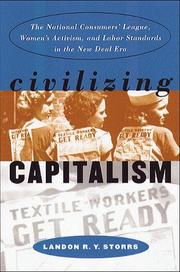
ISBN: 0807848387 0807825271 0807860999 9780807860991 9780807825273 9780807848388 9798890871121 Year: 2000 Publisher: Chapel Hill : University of North Carolina Press,
Abstract | Keywords | Export | Availability | Bookmark
 Loading...
Loading...Choose an application
- Reference Manager
- EndNote
- RefWorks (Direct export to RefWorks)
Aiming to offer fresh insights into the history of labour policy, the New Deal, feminism, and southern politics, the author of this work examines the New Deal era of the National Consumers' League, one of the most influential reform organizations of the early 20th century.
Child labor. --- Industrial welfare. --- Labor laws and legislation. --- Labor movement. --- New Deal, 1933-1939. --- Women. --- Women social reformers. --- Working-women's clubs. --- Business. --- Business & Economics --- Labor & Workers' Economics --- Women social reformers --- Working-women's clubs --- Women --- Child labor --- Industrial welfare --- Labor movement --- Labor laws and legislation --- History. --- Employment --- National Consumers' League --- New Deal, 1933-1939 --- Occupational social work --- Social work, Occupational --- Social work in industry --- Welfare, Industrial --- Welfare work in industry --- Children --- Employment of children --- Human females --- Wimmin --- Woman --- Womon --- Womyn --- Working-girls' clubs --- NCL --- Social service --- Labor --- Age and employment --- Females --- Human beings --- Femininity --- Working class women --- Societies and clubs
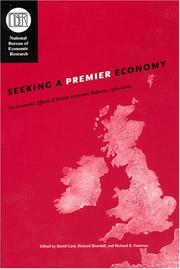
ISBN: 0226092844 9786611223205 1281223204 0226092909 9780226092904 9780226092843 Year: 2004 Publisher: Chicago : University of Chicago Press,
Abstract | Keywords | Export | Availability | Bookmark
 Loading...
Loading...Choose an application
- Reference Manager
- EndNote
- RefWorks (Direct export to RefWorks)
In the 1980's and 1990's successive United Kingdom governments enacted a series of reforms to establish a more market-oriented economy, closer to the American model and further away from its Western European competitors. Today, the United Kingdom is one of the least regulated economies in the world, marked by transformed welfare and industrial relations systems and broad privatization. Virtually every industry and government program has been affected by the reforms, from hospitals and schools to labor unions and jobless benefit programs. Seeking a Premier Economy focuses on the labor and product market reforms that directly impacted productivity, employment, and inequality. The questions asked are provocative: How did the United Kingdom manage to stave off falling earnings for lower paid workers? What role did the reforms play in rising income inequality and trends in poverty? At the same time, what reforms also contributed to reduced unemployment and the accelerated growth of real wages? The comparative microeconomic approach of this book yields the most credible evaluation possible, focusing on closely associated outcomes of particular reforms for individuals, firms, and sectors.
Electronic books. --- Great Britain - Economic conditions - 1997- - Congresses. --- Great Britain - Economic policy - 1979-1997 - Congresses. --- Great Britain - Economic policy - 1997- - Congresses. --- Economic History --- Business & Economics --- Great Britain --- Economic conditions --- Economic policy --- GB / United Kingdom - Verenigd Koninkrijk - Royaume Uni --- 332.810 --- 332.20 --- 368.43 --- 332.832 --- 658.324 --- 331.33 --- Arbeidsduur: algemeen. --- Bezoldiging van de arbeid: algemeenheden. --- Ouderdomsverzekering. Voorbarige dood. Weduwen en wezen. --- Pensioen. Brugpensioen. --- Pensioenen. Verzekeringen. --- Structureel beleid. Reglementering. Dereglementering. Ordnungspolitik. --- Structureel beleid. Reglementering. Dereglementering. Ordnungspolitik --- Bezoldiging van de arbeid: algemeenheden --- Arbeidsduur: algemeen --- Pensioen. Brugpensioen --- Ouderdomsverzekering. Voorbarige dood. Weduwen en wezen --- Pensioenen. Verzekeringen --- E-books --- BUSINESS & ECONOMICS / General. --- economy, economics, reform, britain, england, thatcher, government, united kingdom, capitalism, market, deregulation, privatization, welfare, industrial relations, benefit programs, joblessness, unemployment, unions, labor, schools, hospitals, healthcare, inequality, productivity, employment, poverty, nonfiction, real wages, growth, microeconomics, british new deal, mobility, economic performance, pension, manufacturing, foreign-owned firms, compensation.
| Listing 1 - 10 of 12 | << page >> |
Sort by
|

 Search
Search Feedback
Feedback About UniCat
About UniCat  Help
Help News
News